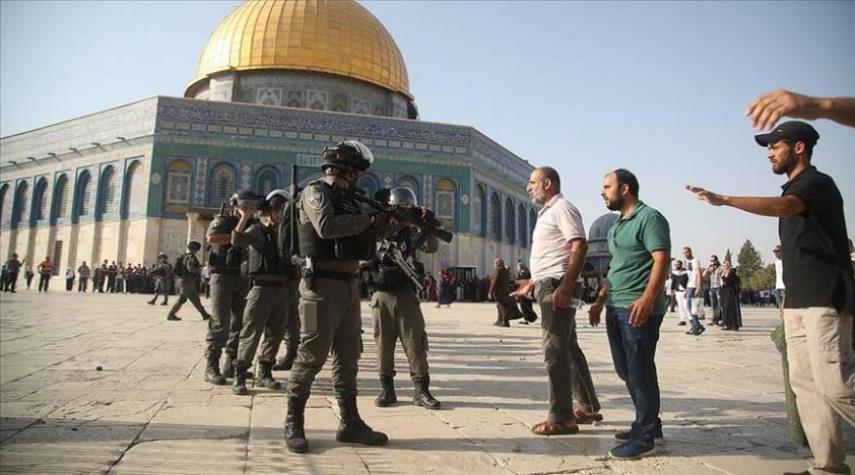Ali Abdi, in an interview with the website of the Strategic Council on Foreign Relations, referred to the racist attacks of the Zionist regime police on Al-Aqsa Mosque and the clashes in recent days in which a large number of Palestinians have been injured and stated: The Zionists, based on their security assessments, had predicted a tense month of Ramadan, they even reached out to the Jordanian and Egyptian governments, urging Jordan to use its traditional ties to curb popular uprisings along the West Bank and asked the Egyptian intelligence apparatus to use its traditional influence in Gaza.
Causes of clashes in Al-Aqsa Mosque
Saying that the Zionist regime and the reactionary and compromising governments of the region do not want any special developments in Palestine, he added: Palestine was prone to some changes due to the developments of the past year. Meetings held before Ramadan were also effective in this regard; one of those meetings was the one at the port of Aqaba in Jordan, which took place between the Crown Prince of the UAE and the Prime Minister of Iraq in the presence of the King of Jordan and the president of Egypt.
The expert on Zionist regime affairs continued: In the past weeks, the Sharm al-Sheikh meeting was also held between Mohamed bin Zayed, el-Sisi and Naftali Bennett. Another meeting was held in the Negev Desert, where Ben-Gurion is buried, in the presence of the foreign ministers of Morocco, the UAE, Bahrain and Jordan, as well as the Zionist regime and the United States.
Abdi, saying that the UAE was present in all those meetings and today it has been turned into special dealer of the Zionist regime in the region, added: Those movements had made the Palestinian people very upset and angry; because some Arab regimes serve the Zionist regime in this way without resolving the issue of Palestine or helping in this direction. Such conditions altogether led the Palestinians to protest and raise the question that nothing would be resolved until their basic rights are secured, even if all the Arab countries make a cooperation deal with the Zionist regime.
He added: From late March, new uprisings began in Palestine, first with individual attacks to the extent that it severely damaged the security of the Zionist regime up to the brink of crisis. Later, it turned into tensions in the city of Beit-ul-Moqaddas and the city of Al-Aqsa Mosque, of course, the Zionists were also the cause of tension in Al-Aqsa Mosque; because they had announced that they wanted to perform the religious rituals of Passover and make sacrifice in the courtyard of the mosque for the first time in about 2,000 years, and this was a clear insult to the Palestinians.
Abdi referred to the Palestinian rallies and the clashes with the Zionist regime police that took place after the call for making sacrifice in Al-Aqsa Mosque and said: Since the Zionists themselves had started the crisis, they started forging and distorting and the foreign minister and the prime minister that regime falsely claimed that for realizing rights of all, including Muslim worshipers, they are present in Al-Aqsa Mosque and that extremists have occupied and damaged the mosque! They are afraid of the escalation of the conflict and its consequences.
Zionist regime worried about formation of a new Intifada
The expert on the developments of the Zionist regime emphasized: The Zionist regime is worried about a new Intifada for various reasons and is trying to prevent its occurrence.
Regarding the Zionist regime’s objective of holding the Passover feast in Al-Aqsa Mosque and attempting to change the identity of the mosque and its historical and legal distortion, he noted: The Zionist regime government can never officially discuss such objectives. The division of work has been as such that the extremist Zionist groups follow such plans and the Zionist regime government openly oppose them, but in reality, behind the scenes, coordination and work division have taken place.
Zionist regime’s attempt to change identity of Al-Aqsa Mosque
Abdi, noting that the ultimate purpose of the Zionist regime in taking such measures is to change the identity of Al-Aqsa Mosque, added: We should not forget that the second Intifada began with the desecration of Al-Aqsa Mosque by Ariel Sharon. This shows that the political apparatus of the Zionist regime seeks to change its identity, but because it is afraid of its consequences, it tries not to turn the tensions after its actions toward itself. In the case of the Flag March, which is one of the factors in the boycott of the Palestinians, we see that the main intention is to make an attempt to change the identity of Al-Aqsa Mosque.
Regarding the consequences of the conflict in Al-Aqsa Mosque and the possibility of the Zionist regime achieving its objectives and the formation of a new Intifada, the analyst of Zionist regime affairs said: As long as the Palestinian people are awake and on the scene, the Zionist regime cannot succeed in this regard. As the Zionist regime now knows, no move is hidden from the point of view of the Palestinians. Hamas, like last year, argued that if there was an adventure, the Resistance would have to react, and that the experience of the battle of Saif al-Quds was so difficult for the Zionist regime to try to resolve the issues.
Criticizing some Arab regimes that seemingly condemn the actions of the Zionist regime, but in fact have the highest levels of political, economic and security relations with it, he continued: The main player in this field is the Palestinian people, especially the people of the West Bank and the city of Beit-ul-Moqaddas. The whole attempts of the Zionist regime in this regard was that the protests would not turn into an Intifada. All their efforts were to prevent happening of anything until Quds Day, which could relieve the Zionist regime to some extent.










0 Comments